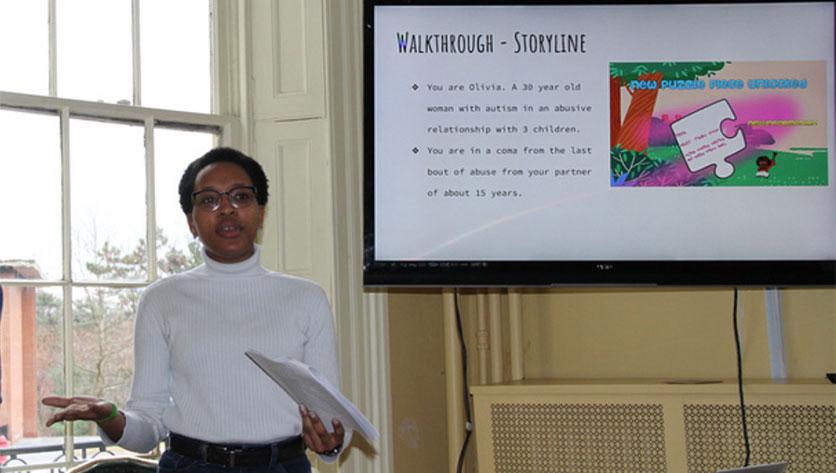Gaming Expert Panel Brings Industry Knowledge and Experience to NDMU Students

National gaming experts and industry professionals served on a panel of judges to review Notre Dame of Maryland University (NDMU) student’s capstone projects in an innovative new gaming course at NDMU.
The course, launched in Fall 2019 for the NDMU’s Morrisey Honors Program explores gaming through a variety of lenses including history, marketing, race, gender, behavior, addiction, learning, and mass media. This class is one of many opportunities for NDMU students to explore paths in STEM (science, technology, engineering, and math).
Ryan Schaaf, associate professor of education, structured the class with modern-day learning approaches, utilizing project-based learning and public speaking. “When you unpackage the phenomena of video games, you discover it is rich in areas to research and study,” said Schaff. “The projects required students to utilize practical, analytical, and creative intelligence to develop a real-world product in order to present it to an authentic audience of experts. This course encapsulates what 21st-century learning should be.”
For the capstone project, students worked in pairs as game developers and pitched a game proposal for eventual development to industry experts for professional feedback. Shannon Bishop, Director of Content at PBS KIDS Digital, Suzi Keehn, CEO/Founder of DIG-IT! Games, and Greg Toppo, writer and author of The Game Believes in You were all invited to serve as the panel of experts. For the capstone, each pair of students presented an in-depth look at their game, what they hoped to accomplish with it, who their game was tailored for, and even presented a trailer for their game.
Proposed games included “Wunderlust,” an education game set in both the modern world to teach students foreign language and the ancient world to teach history; “Olivia,” a serious game aimed at giving young adults a better understanding of the life of someone suffering from domestic abuse; and “Civil War & Zombies,” an action-adventure game where players fight zombies and learn about the Battle of Gettysburg.
The experts asked the students probing questions, encouraging them to think critically about what they wanted from their game from a developer’s perspective, and what audiences would want when playing it. They also touched on the successful pieces of their games and provided feedback on the possible ways to improve on their concept.
For the students, the chance to practice public speaking and presentation skills, and to hear from other successful women in the industry, was an invaluable opportunity. Ciarese De Torres ‘20 said of the experience “Their feedback for us was more enlightening and exciting for what’s to come, and for future game ideas, game concepts, even just game classes in general.”
As for the experts, it was impressive to see the research and thought that had gone into the game proposals and presentations. Toppo noted, “They were well thought out, and very interesting, very good concept of what they wanted to do.” When asked about their perspective on the experience for the students, Keehn remarked “It’s always helpful to have real-world feedback. We all live in our own bubbles, and it’s nice to have somebody from a completely different environment. I wish I had had an opportunity like this.”




